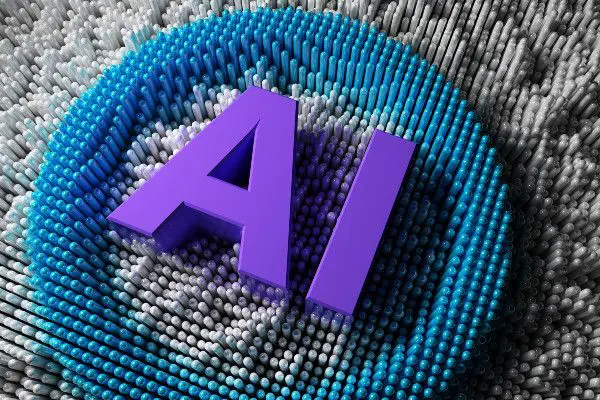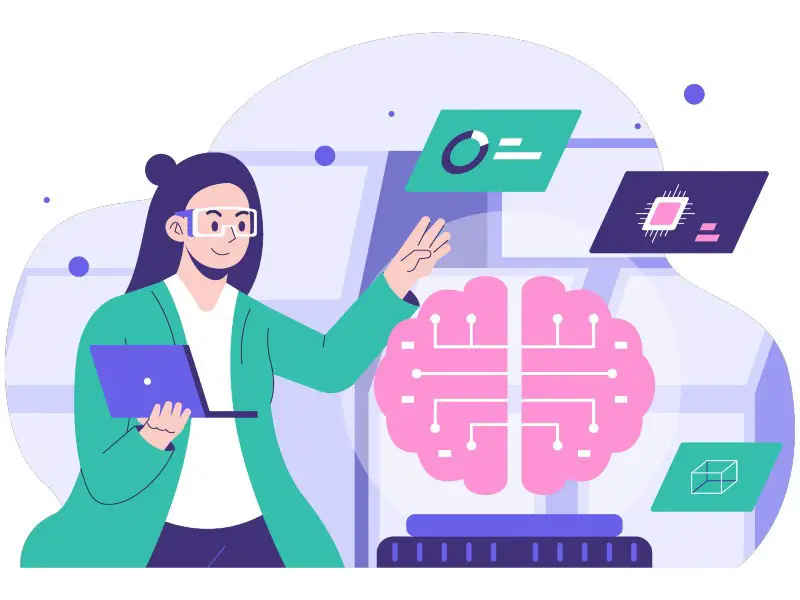Introduction
In an ever-evolving digital landscape, businesses are constantly seeking innovative ways to create more personalized, efficient, and impactful marketing strategies. The advent of Artificial Intelligence (AI) has unlocked a myriad of possibilities for marketing professionals, offering tools and insights to enhance engagement, optimize campaigns, and deliver unparalleled customer experiences.
The revolution of AI in marketing is vast and transformative, providing opportunities to revolutionize digital marketing, redefine customer experience, and establish new marketing strategies on social media. This blog post delves into these facets, exploring the role of AI in marketing, its implications, and the future it holds. By shedding light on specific examples, we unravel the exciting prospects of AI, a game-changer in the world of marketing.
AI in Marketing
Artificial Intelligence is dramatically reshaping marketing as we know it. AI algorithms can sift through vast amounts of data, identifying patterns and providing actionable insights that were previously unattainable. From customer segmentation to predictive analytics and personalized marketing, AI has become a cornerstone in strategic marketing decision making.
One company that stands out in leveraging AI for marketing is Amazon. Amazon uses AI to analyze user behavior, preferences, and buying patterns to provide personalized product recommendations. Their recommendation engine, underpinned by AI, fuels a substantial portion of the company’s revenue, signifying the immense power of AI in enhancing marketing outcomes.
Further, platforms like Phrasee are using AI to optimize email marketing. Phrasee employs Natural Language Generation and machine learning to generate marketing language that resonates with target audiences. The software can predict how certain phrases will perform, helping marketers craft more effective email subject lines and improve open rates. This demonstrates the sophistication of AI’s predictive capabilities in marketing and its ability to enhance customer engagement.
Moreover, companies like Crayon utilize AI to provide competitive intelligence. Crayon’s AI-driven platform tracks a wide array of online data sources to provide real-time updates on competitors’ activities. This intelligence enables businesses to keep a finger on the pulse of their competitive landscape, informing strategic marketing decisions and providing a competitive edge.
These examples show how AI has permeated every facet of marketing, offering tools to enhance customer targeting, improve engagement, and keep ahead of the competition.
Which of the following industries commonly requires data entry tasks?
Understanding the Role of AI in Marketing
Artificial Intelligence plays a multifaceted role in marketing. From improving customer interactions to enabling targeted marketing campaigns and providing actionable insights, AI is instrumental in streamlining and optimizing various marketing processes.
One classic example is Albert, an autonomous digital marketer that leverages AI to handle a variety of marketing tasks. Albert can create social media posts, analyze the performance of campaigns, and make recommendations for optimizing marketing strategies. The platform serves as a prime example of how AI can be used to enhance marketing efficiency and effectiveness.
Artificial Intelligence A Modern Approach
Unveiling the ultimate guide to the dynamic world of artificial intelligence – Artificial Intelligence: A Modern Approach, 4th Edition. Revel in the richness of updated content, designed to propel your understanding of AI into the future. This expertly curated edition not only explores, but also breathes life into the extensive realms of AI.
Experience AI like never before, with our expansive coverage on the state-of-the-art technologies. Unify your understanding of AI concepts, enhanced and refined for intuitive learning. Dive deep into machine learning, bask in the intricacies of deep learning, and voyage through the fascinating dimensions of transfer learning.
Explore the grandeur of multiagent systems, and the mesmerising world of robotics. Engage with natural language processing and understand causality, all while navigating the expanse of probabilistic programming. At the core of our new edition is the commitment to responsible AI, with comprehensive discourse on privacy, fairness, and safe AI.
Artificial Intelligence: A Modern Approach, 4th Edition is your passport to the future of AI. Embark on this thrilling journey and discover the limitless possibilities of what you can accomplish with AI.
How AI is Revolutionizing Digital Marketing
AI’s role in digital marketing cannot be overstated. It is a tool that empowers businesses to create personalized, dynamic, and responsive marketing strategies. Through AI, businesses can better understand customer behavior, enhance personalization, and optimize ad targeting.
Take, for example, Acquisio, a platform that uses machine learning algorithms to optimize digital marketing campaigns. Acquisio’s AI capabilities allow it to analyze campaign performance, make real-time adjustments to optimize results, and even predict future performance based on past data. Such capabilities are transforming the way marketers approach and execute their digital marketing strategies.
In the next sections, we will examine how AI is reshaping the customer experience and revolutionizing social media marketing strategies.
The Definition and Impact of AI in Customer Experience
Artificial Intelligence is rapidly redefining customer experience. In the realm of marketing, AI-driven customer experience refers to the use of machine learning, natural language processing, and other AI technologies to understand, predict, and meet customer needs more efficiently and effectively.
A prime example of this is the use of AI-powered chatbots. Brands like Sephora utilize chatbots to provide instant, personalized customer support. Sephora’s chatbot helps customers choose products, book appointments, and get answers to their queries, providing a seamless and engaging shopping experience.
Additionally, AI is being used to improve customer experience through personalized marketing. Companies like Netflix employ AI algorithms to analyze viewer behavior and preferences to provide highly personalized content recommendations. This high level of personalization enhances customer engagement and satisfaction, driving customer retention and loyalty.
AI in Social Media: A New Marketing Strategy
Social media platforms have become a goldmine for marketers, with an unprecedented amount of user data available. With AI, marketers are able to sift through this data to glean valuable insights, allowing them to create more targeted and effective social media marketing strategies.
One notable application of AI in social media marketing is sentiment analysis. Tools like Brandwatch utilize AI to analyze social media data and gauge public sentiment towards a brand or product. This information can help marketers understand customer attitudes, preferences, and pain points, informing marketing strategies and decision making.
Furthermore, platforms like Pattern89 leverage AI to optimize social media advertising. Pattern89’s AI algorithms analyze thousands of ad elements to determine what works best, providing recommendations for optimizing ad performance. Such insights allow marketers to create more effective and efficient social media advertising campaigns.
Predictive Analytics and AI: A Marketing Game Changer
Predictive analytics, powered by AI, is changing the game in marketing. By analyzing historical data, AI can predict future customer behavior, market trends, and campaign performance, providing a competitive edge to businesses.
Companies like IBM are leading the way in AI-driven predictive analytics. IBM’s Watson Marketing uses machine learning algorithms to analyze customer data and predict future behaviors and trends. Such predictive capabilities allow marketers to stay ahead of the curve, informing strategic decision making and improving marketing effectiveness.
Similarly, platforms like Salesforce leverage AI for predictive lead scoring. Salesforce’s Einstein AI analyzes a wide array of data to predict which leads are most likely to convert, helping businesses prioritize their marketing efforts and increase conversion rates.
Conclusion
Artificial Intelligence has undoubtedly emerged as a groundbreaking force in the marketing arena. Its transformative power is visible across multiple aspects of marketing, from customer experience optimization to creating hyper-personalized marketing strategies, and offering predictive analytics.
From our examination of AI’s role in marketing, it is clear that the technology is revolutionizing the way marketers understand, engage, and serve their customers. Tools like Albert, Acquisio, and Phrasee exemplify AI’s effectiveness in optimizing marketing strategies and enhancing marketing efficiency. Meanwhile, the likes of Amazon, Sephora, and Netflix demonstrate AI’s potential in delivering personalized customer experiences that drive engagement and loyalty.
AI’s role in social media marketing has also been transformative. Platforms like Brandwatch and Pattern89 highlight the technology’s power in extracting valuable insights from social media data, leading to more targeted and effective marketing strategies. Finally, AI-driven predictive analytics, as evidenced by IBM’s Watson Marketing and Salesforce’s Einstein AI, are helping marketers stay ahead of the curve, informing strategic decision making and improving marketing effectiveness.
The influence of AI in marketing is expansive and continues to grow. As the technology advances, it promises even more opportunities for marketers to create more personalized, efficient, and impactful marketing strategies. For marketing professionals, understanding and leveraging the power of AI is no longer optional—it’s a necessity for staying competitive in the rapidly evolving digital landscape.

Redefining Business Conversations: A Deep Dive into the ChatGPT Login Experience
83 / 100 Introduction In the age of digital transformation, businesses are increasingly harnessing the power of AI to streamline operations, boost productivity, and deliver



